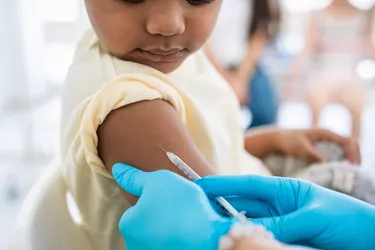
The COVID-19 continues to ravage the world. New variants continue to spread increasingly quickly, with medical experts hopeful that this weakened form of the virus might signal an end to the two-year battle. Although health decisions are personal, experts are still recommending a booster of either Moderna or Pfizer to protect you. In addition, adults over the age of 50, plus some people with other health conditions, are now eligible for a second boost.
First and Second COVID Booster Eligibility
Video of the Day
Before you decide whether to get a booster or not, you'll first need to take a look at booster eligibility requirements. Assuming you received your last Pfizer or Moderna vaccine more than five months ago, or two months with the Johnson & Johnson, you're eligible for a first booster. If you haven't received both initial doses, you're eligible for the initial two shots.
Video of the Day
There are also age minimums. Both the Moderna and Johnson & Johnson boosters are available to those ages 18 and up, while you can get a Pfizer booster if you're 5 or older (the same ages as each vaccine's general eligibility, as of this writing) Best of all, you can get any of the three boosters no matter which vaccine you received initially.
The CDC now recommends a second COVID-19 booster for certain groups. This includes those 12 and older who are immunocompromised and those 50 and older. Anyone in these groups should receive a second booster dose at least 4 months after their first booster, the CDC explains.
New Variants and and Vaccines
While vaccine efficacy studies have indicated that boosters aren't as effective against omicron and the variants that have followed as they were against previous variants, being boosted does give you better protection than if you were unvaccinated or vaccinated more than five months ago. This applies even if you've had COVID-19 previously. A booster will give you better protection against new variants than natural antibodies, experts say.
But perhaps the most compelling reason to get boosted is to reduce the hospitalization risk. Data from the Centers for Disease Control and Prevention (CDC) shows that the booster was 90 percent effective at preventing hospitalization and 82 percent effective at preventing urgent care and emergency room visits. While many boosted patients have reported symptoms no worse than the cold or flu, unvaccinated patients often have effects that are far worse.
How to Get Boosted
Getting boosted is easier than ever, especially now that the option has been available for a while. You can use Vaccines.gov to find a booster shot provider nearby. Simply input your ZIP code and choose the type of booster you want.
The easiest method for many consumers is simply to go to a nearby pharmacy or drugstore. Walgreens, CVS and Walmart all offer COVID-19 boosters, along with most large grocery store chains. Some pharmacies host vaccination clinics where you can get boosted from the comfort of your car.
Prepare for Your COVID Booster
Once you've made your appointment, it's time for some booster shot preparations. Experts advise against taking over-the-counter medications like ibuprofen or acetaminophen before your shot, but you should continue with all doctor-prescribed medications. Take your vaccine card with you, as well as your identification, and be prepared to wait 15 minutes afterward to make sure there are no immediate adverse effects.
Side effects are a natural part of any vaccine. COVID-19 booster side effects can include:
- Pain, redness and swelling at the injection site
- Fatigue
- Headache
- Muscle pain
- Chills
- Fever
- Nausea
Safety Precautions After Booster
Although being boosted does protect you against severe COVID-19, with omicron still spreading and potential other variants on the way, it's always best to play it safe. This is especially important if you're part of the vulnerable population, which includes those over 65 and the immunocompromised.
If you are exposed to COVID-19 after being boosted, CDC quarantine recommendations state that you should wear a mask around others for 10 days and test on day five. Regardless of vaccination status, if you test positive, you should stay home for five days and continue to wear a mask when you're around other people from day six onward.
A booster can give you the protection you need against whatever COVID-19 variants you encounter. Even if you catch the virus, your risk of hospitalization or serious illness decreases substantially when you are fully vaccinated. If you're ready to get boosted, chances are, you can find a location near you that can work you in soon, and all you'll need is your vaccination card and an ID to complete the process.
- The Harvard Gazette: Omicron Optimism and Shift From Pandemic To Endemic
- FDA: Do I Qualify for a COVID-19 Vaccine Booster and Which One?
- The Harvard Gazette: No Omicron Immunity Without Booster, Study Finds
- CDC: Preparing for Your Vaccine
- CDC: CDC Updates and Shortens Recommended Isolation and Quarantine Period for General Population
- Centers for Disease Control and Prevention: Morbidity and Mortality Weekly Report
- CDC: CDC Strengthens Recommendations and Expands Eligibility for COVID-19 Booster Shots